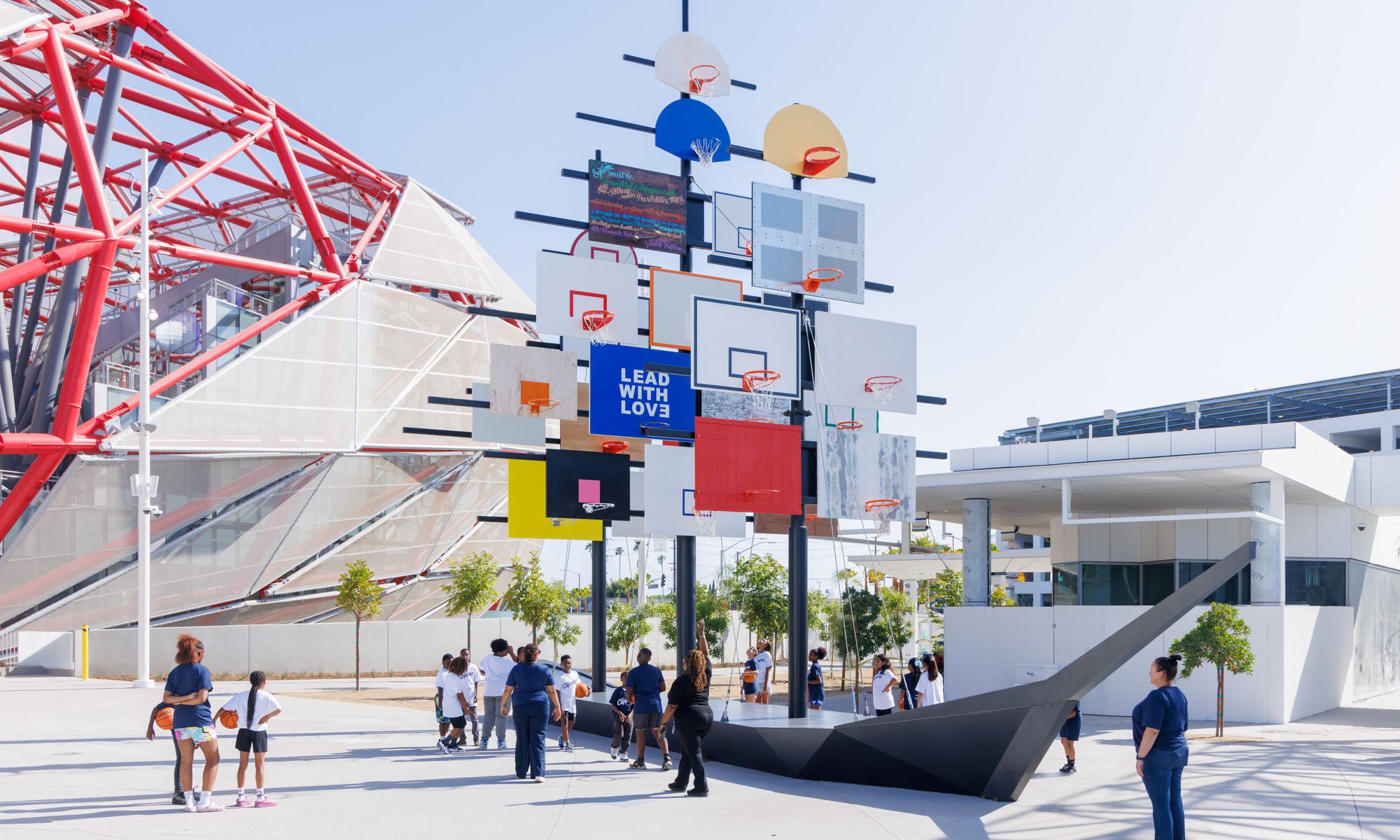Glenn Kaino's Sails (2024) Photo: Iwan Baan, Courtesy Intuit Dome
Public art is stepping up its game in Inglewood, California, with the opening of the Intuit Dome, the $2bn arena that will be home to the Los Angeles Clippers basketball team.
Seven artists with international and regional reputations were tapped to create works that emphasise community and engagement in order to create an "urban oasis… envisioned as a gathering place" in partnership with the City of Inglewood, said Gillian Zucker, chief executive of Halo Sports and Entertainment (the Clippers’ parent company), during the 11 July unveiling. The project’s art consultant, Ruth Berson, then presented the six completed works—by Refik Anadol, Glenn Kaino, Patrick Martinez, Michael Massenburg, Kyungmi Shin and Jennifer Steinkamp, with an additional work by Charles Gaines to come—to a crowd that included art-world heavyweights (museum heads and curators, collectors and quite a few artists), as well as community leaders.
The Intuit Dome’s public art fulfils the percent-for-art requirement that the City of Inglewood places on commercial construction projects, and this one tallies a hefty $11m—an amount that includes curatorial and artist fees as well as production, shipping and so on. Berson, a former deputy director of curatorial affairs at the San Francisco Museum of Modern Art, is well versed in contemporary art and artists, especially those in California. “The developers were very interested in having artists of quality," she tells The Art Newspaper, "who really could think about the community and provide a sense of joy and a sense of wonder, and who represented the LA region.” And, of course, she sought artists who could work at the large scale required for the 26-acre site.
Refik Anadol, still from Living Arena (2024) Photo: Iwan Baan, Courtesy Intuit Dome
The two largest works also involve the most tech: Anadol’s Living Arena and Steinkamp’s Swoosh. Set in the outdoor plaza, Living Arena is shown on an LED screen 40 ft tall by 70 ft wide and switches between a real-time diagram of planes flying into and out of the nearby Los Angeles International Airport (LAX) and a real-life basketball game in schematic form, among other narrative data created using artificial intelligence. (Since no games have been played yet at the Intuit Dome, a past game was used as a demo.)
Steinkamp, known for animations of plants that sway in the wind, made a major departure with Swoosh. Here, she created lighting design that sweeps across the diamond-shaped panels covering the Intuit Dome, suggesting speed and movement through space. In her preliminary research for the project, she studied other public art in Inglewood. "Dappled light, that's one of the recurring themes," she says she noticed. "So I kept that as a theme." Lights installed in the corners of the panels illuminate and change colours according to five sequences and will be visible to passengers flying into and out of LAX at night. The artist tested out her ideas on a computer using a 3D map of the roof of the building, and at one point used virtual-reality goggles to "view" the sequences from different vantage points.
Three of the new arena’s works are at the busy corner of Prairie Avenue and Century Boulevard and can be seen from the street. Martinez’s Same Boat is a text piece, a neon sign quoting the Civil Rights leader Whitney M. Young: “We may have all come on different ships but we’re in the same boat now.” Meanwhile, Shin's Spring to Life is a tall, multicoloured glass mural depicting basketball players moving through a stream-like background. (Her research showed that there had once been a natural spring in the neighbourhood.)
Along Prairie is Massenburg’s 100-ft-long mural Cultural Playground, made of porcelain enamel on steel panels. "I wanted to create something that was going to bring all the different communities together," says Massenburg, who lives in Inglewood. "Because we're so separated by freeways and trying to get here and there.” The mural is a series of exuberant vignettes that include people of different ethnicities singing, dancing and making music.
Jennifer Steinkamp's Swoosh (2024) Photo: Iwan Baan, Courtesy Intuit Dome
Inside the plaza is the sole sculpture, Kaino’s Sails. An avid basketball fan, the artist created his version of a clipper ship with the “sails” made of basketball backboards modelled after different ones he found in various cities and neighbourhoods. "Some of them are direct references," he said during a walkthrough. "There's a basketball backboard in Oregon that was a barn door in red. Some are a mix of two or three different backboards. My hope is that people walking by will recognize a piece of the backboard and understand that we're all connected to each other one way or another."
Notably, the first public event at the Intuit Dome will not be a basketball game but a Bruno Mars concert on 15 August. There are a number of large venues in the neighbourhood that host not only sporting events but also concerts and other events, as well as their own art installations. The Intuit Dome seats up to 17,700 people and is within walking distance—should Angelenos choose to walk—of SoFi Stadium (seating 70,000) and the recently opened Cosm (seating 1,750), which presents immersive programming using its own proprietary LED system. These venues are part of the futuristic Hollywood Park development, which also includes condominiums, movie theatres, shops and a casino.
Cosm Los Angeles is the first of a series of immersive spaces built by the entertainment, media and technology company Cosm. (Cosm Dallas is coming soon.) The venue emulates a “you-are-there” feeling with an LED screen that stretches over part of the ceiling and continues onto a curved wall. While it will mostly be used to transmit live sporting events, it will also host other kinds of programming. In the opening weeks, Cosm has scheduled Cirque du Soleil’s O, as well as the artist Nancy Baker Cahill’s Seek—a specially commissioned piece with strong environmental themes.

